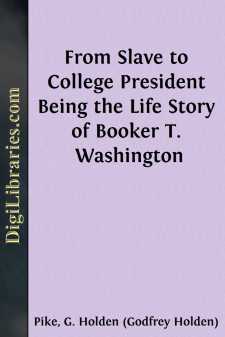Categories
- Antiques & Collectibles 13
- Architecture 36
- Art 48
- Bibles 22
- Biography & Autobiography 813
- Body, Mind & Spirit 142
- Business & Economics 28
- Children's Books 16
- Children's Fiction 13
- Computers 4
- Cooking 94
- Crafts & Hobbies 4
- Drama 346
- Education 46
- Family & Relationships 57
- Fiction 11829
- Games 19
- Gardening 17
- Health & Fitness 34
- History 1377
- House & Home 1
- Humor 147
- Juvenile Fiction 1873
- Juvenile Nonfiction 202
- Language Arts & Disciplines 88
- Law 16
- Literary Collections 686
- Literary Criticism 179
- Mathematics 13
- Medical 41
- Music 40
- Nature 179
- Non-Classifiable 1768
- Performing Arts 7
- Periodicals 1453
- Philosophy 64
- Photography 2
- Poetry 896
- Political Science 203
- Psychology 42
- Reference 154
- Religion 513
- Science 126
- Self-Help 84
- Social Science 81
- Sports & Recreation 34
- Study Aids 3
- Technology & Engineering 59
- Transportation 23
- Travel 463
- True Crime 29
From Slave to College President Being the Life Story of Booker T. Washington
Categories:
Description:
Excerpt
CHAPTER I
WANTED: A MAN—THE MAN FOUND
Just at the most severe crisis of the war between France and Germany, over thirty years ago, a London newspaper, in describing the situation, remarked that France wanted not men, but a Man. During a whole generation which followed after the close of the gigantic and sanguinary conflict between the Northern and Southern States of the American Republic, a similar remark would have applied to the millions of slaves who, though nominally free, were drifting hither and thither, now groping in the wrong direction altogether, or missing opportunities they might have embraced, had there but been one commanding personality in their midst to give the word and lead the way. There seemed to be too many negroes, while they were still increasing with a rapidity which inspired misgiving. The race seemed to be "at sea" for want of a Man. At length the much-needed chief or leader was found in Booker T. Washington, whose distinguished work on behalf of the race at the great institution which he has founded at Tuskegee has given him a world-wide reputation. As a negro, his mission is to the men and women of his own nation.
In regard to this man with his commanding personality, the International Monthly of New York says:—"At the present time he is universally recognised as the foremost representative of his race. He is eagerly sought after as a speaker. Whatever he chooses to write immediately finds a willing publisher. Newspaper eulogy declares him to be a remarkable orator. He is often spoken of as of solid, and even brilliant, intellectual attainments. How much of all this vogue and of this unusual reputation is based upon the fact that he is a negro, and how much upon his native merit when weighed and judged without regard to any other consideration whatsoever? Has he, in fact, done that which, had he been a white man, would have given him a solid and substantial claim to the esteem that he now enjoys?"
Mr Harry T. Peck, who writes thus, ventures the opinion that the estimate of the public in regard to Booker Washington is exaggerated. "There is no evidence that his mind is in any way exceptional," he adds.... "Were he a white man, he never would be singled out for eminence.... He is not an orator; he is not a writer; he is not a thinker. He is something more than these. He is the man who comes at the psychological moment and does the thing which is wanting to be done, and which no one else has yet accomplished." This can hardly be accepted as genuine criticism. Just as we judge a tree by its fruits, so we measure capacity, and even genius, by its results. If, as is generally acknowledged to be the case, Booker Washington has practically solved that Race Problem which American politicians have hardly dared to face since the close of the Civil War, it is only fair that we accord him the distinction of possessing that original shrewdness which may even be called genius. When an idea of exceptional value is given forth, one that is all the greater on account of its simplicity, people seem to be naturally disposed to underrate the power which gave it utterance. Booker Washington may merely be following in the footsteps of Adam Smith when, instead of regarding the negro population as an evil or a grievance, he prescribes that their labour, as a source of vast wealth, be utilised for the national advancement. Viewed from any other standpoint, there can be no doubt that the rapidly-increasing negroes inspire some disquieting apprehensions as a possible source of inconvenience or of actual danger. Once get the coloured race well under control, however, and the result would be all-round satisfaction.
Thus Booker Washington is not only the man of the hour to his own people; in him the Man who has been wanted for forty years has been found. Being somewhat over forty years of age, he was born in those portentous times towards the end of the sixth decade of the last century when the political horizon of the Republic was darkening and showing symptoms of the coming Civil War....


